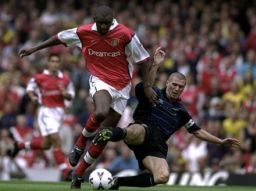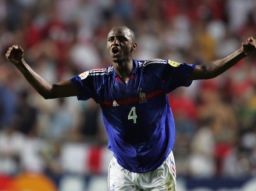CNN’s Human to Hero series celebrates inspiration and achievement in sport. Click here for videos and features
Story highlights
Patrick Vieira won World Cup and European Championship with France
But he refuses to choose between France and the country of his birth -- Senegal
The 37-year-old is now coach of Manchester City's Under-21 side
He has returned to Senegal as part of a program educating children
National heroes don’t always belong to one country. Just ask France’s World Cup-winning star Patrick Vieira.
“I don’t make any difference between France and Senegal – I feel I am both countries,” the football star tells CNN’s Human to Hero series.
By the time he lifted the World Cup as a 22-year-old at France ’98, he had traveled from his family home in Senegal and found a new one in Europe – studying under some of the finest modern footballing minds the continent has produced.
Vieira says this combination of cultures – plus a helping hand from a collection of strangers – led him to become the player he was: leader of championship-dominating teams, holder of 107 caps for France (with 21 coming as captain), and arguably one of modern football’s most complete midfield talents.
Now it’s his turn to be the inspiration.
He’s the rising coach to the next generation of stars and – talking to CNN in Senegal, a country he left behind for almost 20 years – a mentor using football for the wider good.
Coach Vieira is just finding his feet.
“I’m learning on the job,” he smiles.
Today, the 6 foot 3 inch strongman is head of Manchester City’s under-21 side – known as the Elite Development Squad – charged with adding young talent to fuel the big-spending English team’s domestic and European campaigns.
The club is putting the finishing touches to a new $330 million academy complex which will house Vieira’s young men.
In classrooms for 200 students, 16 full-size football pitches and bespoke medical facilities and training centers, the next generation of stars will learn from the man who excelled across the field – and has the World Cup, European Championship and Premier League-winners’ medals to prove it.
“Since I started, I’ve seen the impact I have on the youth because, of course, there’s a massive respect for what I achieved in football,” says the 37-year-old.
“And when I’m talking to them, I see the way they’re looking at me with big eyes … and really taking into consideration all the information I can give them.”
But the move from dressing room to backroom has taken some getting used to, he says.
“It’s not easy because when you’re a player, you’re listening, and then when you’re the coach, you are the one talking – the one who explains things,” Vieira says.
“There is a different way of talking to the players, and I give myself a few years before taking the big step.”
Vieira the apprentice
He learned from the best – playing under the likes of Arsene Wenger, Jose Mourinho, Roberto Mancini, Fabio Capello – in a career that spanned 20 years at the top.
But, Vieira says, it was his determination to fight for a World Cup on his adopted home turf that led him to his first, and most influential, mentor.
As a fledgling member of AC Milan’s scudetto-winning squad of 1995-96 – which included the midfield talents of Marcel Desailly, Roberto Baggio, Roberto Donadoni, and the “Metronome” Demetrio Albertini – the 20-year old Vieira’s chances were limited, and he took to the field only twice.
“It was the World Cup in France and I wanted to be part of it, but obviously I needed to play some games,” he recalls.
“That’s why I left AC Milan and I signed for Arsenal.”
At Arsenal, Vieira met a father figure pushing modern coaching techniques and pioneering new ideas in nutrition and mental preparedness.
Wenger was already renowned as a coach who could unearth and develop dormant talent, helping George Weah to become FIFA World Player of the Year. As coach at AS Monaco, he had recognized the potential of the young Vieira – whose top-level career started at French club Cannes – and urged Arsenal to buy him before he signed on as manager.
On the London club’s training field, he channeled Vieira’s natural strength and athleticism, paired with intelligent positioning, to mold the player into a box-to-box midfielder – a role that many had written off as extinct in the modern game.
But off the field Vieira learned as much from le professeur.
“Arsene Wenger was really important for me as well because he make me grow up as a man and as a player,” he says now.
Invincible
In nine trophy-laden years with Arsenal, Vieira would take center spot in a team that overflowed with class – playing youthful, attacking football that fans, neutrals and all but the most hardened opponents were compelled to applaud.
He claimed three top-flight titles and four FA Cups, including two domestic doubles, and became the commander of the only team to last an entire Premier League season undefeated.

To Arsenal fans, his legendary status – alongside fellow 2003-04 “Invincibles” Thierry Henry, Robert Pires, Dennis Bergkamp and Sol Campbell – was secure.
But above it all, he remembers France’s World Cup.
“Playing the World Cup in 98 was a crazy moment,” Vieira recalls.
“We were watching the news and we saw Paris was going crazy, but not just Paris – France was going crazy.
“And it just looked like a French revolution – people in the street celebrating and it was fantastic and this is when I really realized how football can be powerful.”
On the night of the final, Vieira was left on the bench, as he had been for almost all the tournament, with Arsenal teammate Emmanuel Petit and Christian Karembeu preferred alongside Zinedine Zidane and captain Didier Deschamps.
But with quarter of an hour remaining against Brazil – with Zidane’s two goals separating the teams – he pulled on Les Bleus’ jersey. Looking somewhat like an eager child among men – albeit a very big one – Vieira loped between boxes, effortlessly keeping up with play, as the Brazilian team fought to impose themselves on a match clouded by mystery surrounding talisman Ronaldo.
As France countered from a corner in the final minutes of injury time, Vieira strode high and – with a one-touch pass and the look of an effortless training ground routine – turned a forward ball around the last Brazilian defender to Petit, who slammed home to seal France’s first World Cup title.
Help from strangers
“It took me a long to come back to Senegal because growing up in France, being so young, I didn’t realize how important it was for me,” Vieira says.
At the age of eight, he moved from Dakar to Trappes – an outer-city Paris banlieue estate known for its large North African immigrant population, and the community’s sporadic clashes with authorities.
His grandfather had served with the French army, so the family qualified for citizenship. Vieira says his memories of Senegal are faint – “I felt like I lost my brain,” he says – but he recalls his start in the game.
“I got into football when I was in France – just playing on the street,” he says.
“A guy who was living not too far from our house saw me playing and asked me if I wanted to play in the system, in a club.
“I said, ‘Yes, of course, but the only way I will go is if my friends are coming with me.’ “
The stranger’s intervention would be the first of many people whose faith in Vieira’s footballing abilities would transport him to the world stage. On his way towards a position at Ligue 1’s AS Cannes, he would travel three hours, to Dreux, to play for FC Drouais.
As his family didn’t have car, it was a journey that wouldn’t have been possible without help.
“Dreux was my first club where it was a proper structure and then I met somebody there called Mr. Jacques Autef,” Vieira says.
“He was somebody who was really important to me because he was picking me up from home, taking me to training and bringing me back home.
“This person gave me that discipline to really be in training and go to training every day.”
Maturity
Vieira established himself as a starter in France’s midfield for Euro 2000 – earning a place in UEFA’s Team of the Tournament as his country again triumphed.
After a disastrous 2002 World Cup campaign – in which France failed to score a goal – and a quarterfinal defeat to Greece at Euro 2004, Vieira inherited the captain’s armband from the retiring Zinedine Zidane.
He soon gave it back after convincing the French legend to return for the 2006 World Cup final, where France lost to Italy in the final on penalties after Zidane was sent off for his infamous headbutt on Marco Materazzi.

By that time, Vieira had already left Arsenal and won a Serie A title under Capello at Juventus – though it was stripped from the club’s honors board due to the Calciopoli match-fixing scandal.
Like many Juve stars, Vieira departed in the wake of the club’s imposed relegation, and he went on to win another four scudetti at Inter Milan as his career moved into its twilight years.
As his athleticism slowly waned with age, he assumed an increasingly important role in the dressing room – earning more praise for his “character” and “winner’s mentality” than physicality – as Manchester City attested when signing him in January 2010.
Taking in lessons from Mancini and Mourinho, to add to his wealth of experience, Vieira says he is now ready to chart his own course as a coach.
“The last two years I realized that I really want to do coaching. I want to be on the field, I want to use my experience with young players and one day be a coach of a first team somewhere around the world,” he explains.
Back in Senegal
Today, he’s thankful for the maturity and life experience that football has given him – and is determined to pass on the lessons, even to those who lack his gift for the game.
“The power of football is really simple. Because of football, I speak different languages. Because of football I’ve been traveling all around the world, and football had a massive impact on me developing as a person,” says Vieira.
“So many kids dream to play football, so you can use that sport to promote education and I believe we don’t do it enough.”
That’s why he’s back stood at the front of the classroom – as he does in City’s elite academy – but in front of him are children with a different objective. In a small classroom in Dakar, he’s lending a helping hand to strangers from his other home – as part of a project backed by UNICEF and Western Union to link education and football.
For Vieira, the motive is not purely selfless, and he’s keeping in mindful to rediscover that “lost” part of his brain.
“And every year growing up, I wanted to know where my family grew up, I wanted to know where I grew up, where I was born,” he says.
“With my experience traveling around the world, I realized it was important for me to come back and try to help kids who are here who don’t have the same structure that we have in Europe.
“It takes time, but it’s better to be late than never.”






















